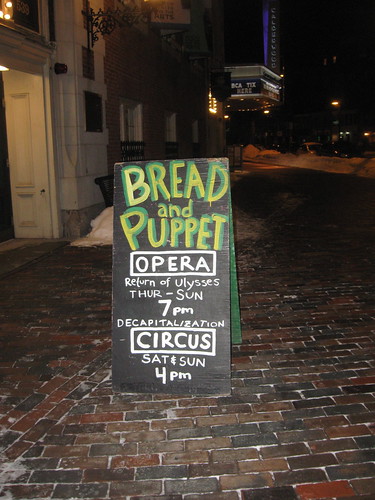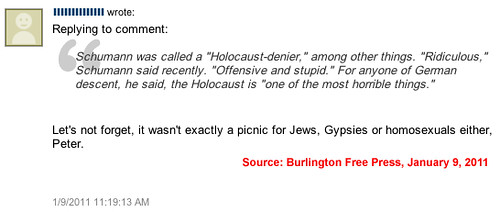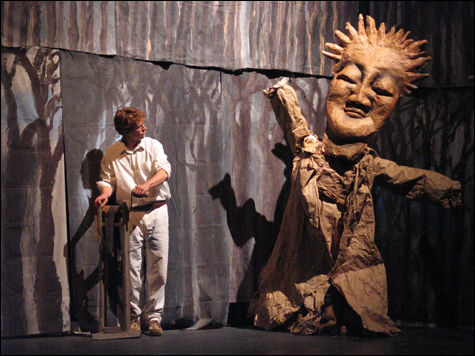As mentioned previously I had been interviewed by Burlington Free Press reporter Tim Johnson as part of a sidebar article regarding the controversial 2007 exhibitions of a series of murals by Bread and Puppet founder Peter Schumann in which he juxtaposed his stylized images of the West Bank with text from John Hersey's 1950 novel The Wall which is set in the Warsaw Ghetto.
At the time I saw the murals at the Boston Center for the Arts in February of 2007, I was preparing to rehearse with Bread and Puppet for the show The Battle of the Terrorists and the Horrorists as I had done for other Boston area shows with Bread and Puppet over the previous four years. The one thematic link in "Independence Paintings" was between the wall that surrounded the Warsaw Ghetto as a German effort to segregate, confine, starve, enslave, and in 1943, exterminate European Jewery and the West Bank wall that was built with the short-term goals of preventing suicide bombers from entering Israel and eliminating the need for Israeli Defense Forces to launch counter-terrorism efforts thus providing an opportunity for greater stability in the West Bank (arguably, this has worked.) I concluded that the comparison between conditions in the Warsaw Ghetto and the West Bank, likening an act of genocide (over a two-year period 500,000 to 600,000 Jews died from forced starvation and overcrowding in Nazi-run Ghettos (roughly 10% of the deaths in Germany's "Final Solution" to "The Jewish Question") to something that, however controversial, had actually saved lives in the middIe of a protracted conflict amounted to cynical trivialization of the Holocaust in order inflame anti-Israeli sentiment, if not a form of Holocaust denial. He was coy as to what he meant but most audience members, including his supporters, seemed to to understand this as an attempt to pin a genocide charge on Israeli. In fact, his supporters used the phrases "Zionist Nazi" and "Zionist Genocide" in order to shut down any critic. I could not morally justify continuing to associate with either Bread and Puppet or Peter Schumann and so I left after one day of rehearsals. I After being verbally harangued in public over my decision to leave, I decided to recount the reasons for my departure.
I did not see the subsequent exhibition in Burlington, but I followed press accounts. (Also see part 2 • part 3 • Part 4)
In the interview with Johnson, however, Schumann said:
"It wasn't meant as a comparison. I simply quoted from a famous book."
Then why quote from that book unless one wants to make a comparison?
At this point I wish to discuss Schumann's statements on the matter in the
Free Press article:
Schumann's work was regarded as offensive by some who saw it as equating policies of the Nazis and of the Israeli government. "Independence Paintings" drew that reaction earlier the same year when exhibited in Boston, where critics saw the juxtaposition of the two walls, and their respective scenes of human suffering, as an odious comparison. Schumann was called a "Holocaust-denier," among other things.
"Ridiculous," Schumann said recently. "Offensive and stupid." For anyone of German descent, he said, the Holocaust is "one of the most horrible things."
I already noted one
anonymous commentator's response. Let us unpack this statement further, Schumann describes himself as being of "German descent." In actuality he was born in 1934 in Breslau, Silesia. What Schumann ellipses is that the part of Silesia in which he was born and raised was at the time part of Germany (the remainder of Silesia would be seized by Germany at the outbreak of World War II.) This meant that for the first eleven years of his life, Peter Schumann lived as a child of the Third Reich. He saw his country's territory expand and then shrink as it was defeated in WWII. The Schumann family were amongst the millions of Germans who became refugees as a consequence of, amongst other things, Allied reaction to Germany's
immoral earnings off of genocide, deportations, slave labor, and seizures. In a March 1, 2006 interview in
Real Change News [N.B.: Real Change News removed the article from their website, but it is available on archive.org.] Schumann stated:
I was born in Silesia, which was German. It became Polish in 1945, after the war. It was part of Germany that was given to Poland by the Yalta Conference. Ninety-nine percent of the population of Silesia was made into refugees at the end of the War and we were part of that 99 percent. We were all looking for a new life, so we live as refugees for a few years.
Indeed, I found it odd that Johnson, despite spending a few paragraphs of a
feature length-article on Schumann's life before coming to America, also never mentions the Third Reich, only identifying Silesia as "a region in central Europe now part of Poland." (Note: I did mention this in my telephone interview with Johnson.)
"It's very hard in America to speak about that subject[the Israeli-Palestinian conflict]," Schumann said. "It needs to be said, but it's not being said."
Actually, it's very easy to speak about the Israeli-Palestinian conflict. There are a diversity of views on the topic, and I certainly have little problem finding such diversity. What Schumann's problem is that in America, there is a strong consensus that Israel is the Jewish homeland and that it has a right to exist within secure borders. There is also a consensus that the the desired resolution to the conflict would feature two states, Israel and Palestine, peacefully side by side. Within that consensus there is a heated debate as to how best to arrive at that desired goal and whether the involved parties are constructively working towards that desired goal, and indeed, whether that goal is reachable in the foreseeable future.
However a January 2008 interview with Schumann with Greg Cook, in the New England Journal of Aesthetic research is quite telling regarding Schumann's views on why "it's very hard in America to speak":
I think it’s awful that the Western community does not interfere with what Israel’s doing as an occupation force. The Western community does not do anything about it. They don’t even speak up against it. They don’t do anything. They basically serve as the Israeli propaganda for the events there.
Note that he shifts from arguing that the "Western community does not interfere" to arguing that the "Western community" is actively serving Israel. This is the old anti-Semitic canard of
Jews or Zionists controlling multiple governments and the international media.
He said the shows often draw picketers, as have talks by other "friends of mine" -- such as Noam Chomsky or the late Howard Zinn
In our telephone interview, Johnson had mentioned to me that Schumann had complained about picketers. It is hard for me to fathom how an elder statesman of "radical" theatre would complain about being the subject of protests.
My work has also been picketed. Perhaps this is a cultural difference, but growing up in a democracy where I was permitted, before attaining adulthood, to read books by
Mark Twain, George Orwell, Aldous Huxley, J.D. Sallinger, Yevgeny Zamatyn, Franz Kafka, or Harlan Ellison, attend plays like
Candide, view films like
A Clockwork Orange, or
The Great Dictator, to listen to comedians like Lenny Bruce, the idea of being picketed is a badge of honor. Perhaps for somebody who grew up in Nazi Germany (though he avoids mentioning it) where dissent could send one to a concentration camp, disagreement is to be feared, and being confronted with disagreement is threatening. I write material which is intentionally controversial, I expect criticism, and I have experienced protest. The price I pay for my freedom of expression is having to acknowledge others' freedom of expression.
It's also a badge of honor because when I look at the small handful of picketers, writers of email invective, abusive visitors to this blog's comments section, I see several consistencies: anti-intellectualism, anti-Semitic rhetoric, conspiracy theories, and
ad hominem attacks. I am proud that these are the sorts of people who feel threatened by the words I write. Schumann is upset that his critics are, in his own words, "a faction of the Jewish community."
It seems quite odd that an elder statesman of "radical" theatre and his supporters are shocked that his work is viewed as controversial, to the point of his supporters routinely
white-wash his biography on Wikipedia.
If Schumann can not handle being called to task for trivializing the Holocaust by either minimalizing the Nazi "Final Solution" or by making insinuations that Israel is pursuing a genocidal program; if he cannot handle the fact that Jews have the same free speech, free press, and free assembly rights as "anyone of German descent"; if his only explanation for the reason why his views are not more widely accepted are because the "western community [... serves] as the Israeli propaganda [apparatus]" then Peter Schumann is an anti-Semite.













